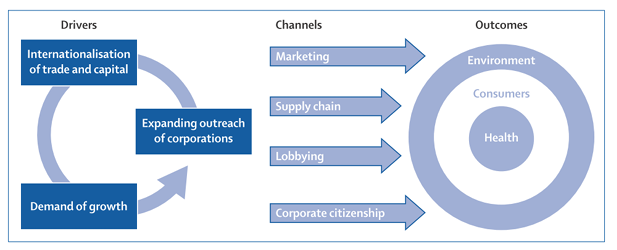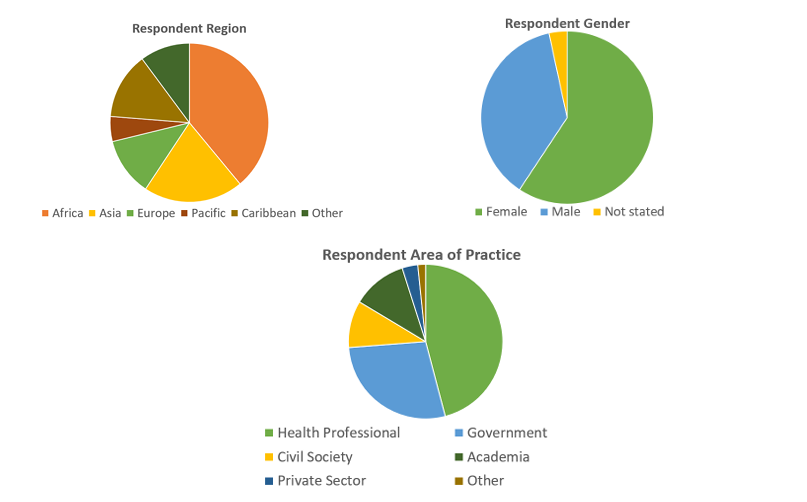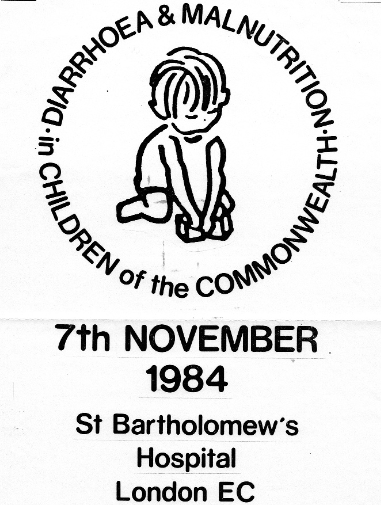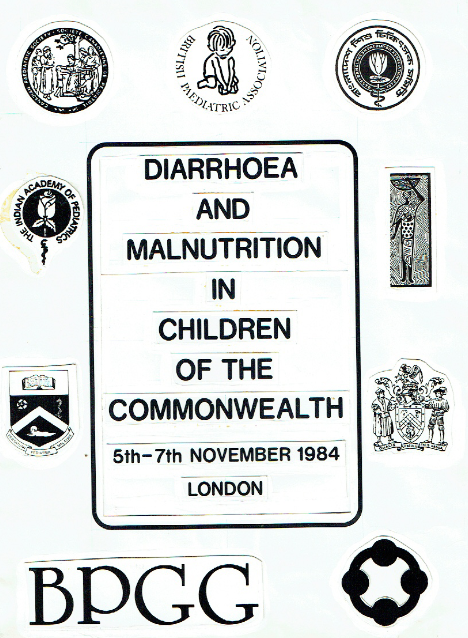Commonwealth Civil Society Policy Forum 2022: Commercial determinants of health: evidence, tools, dialogue and advocacy.

“Commercial determinants of health: evidence, tools, dialogue and advocacy”
1. INTRODUCTION
The Commonwealth Health Professions and Partners Alliance (CHPA) host a policy forum each year in
conjunction with the Commonwealth Health Ministers’ meeting. The CHPA have a commitment to
optimise civil society interaction with Commonwealth Health Ministers and see this as an important
forum for influencing health policy and practice on behalf of the practitioners they represent and for
citizens across the Commonwealth.
Commonwealth Health Ministers meet annually prior to the commencement of the annual World Health
Assembly of the World Health Organisation. Over many years, with the ongoing support of the
Commonwealth Foundation and Commonwealth Secretariat, Commonwealth civil society has actively
sought an opportunity to interact with, and inform Commonwealth Health Ministers at their annual
meeting. Civil society brings a unique perspective to the deliberations of Commonwealth Health
Ministers and it is important that their voice is heard.
In hosting the 2022 CCSPF, the CHPA has an opportunity to partner with a range of other civil society
organisations. The Commonwealth Association of Paediatric Gastroenterology and Nutrition (CAPGAN)
took the lead in organising the 2022 CCSPF on behalf of the CHPA.
2. COMMONWEALTH CIVIL SOCIETY POLICY FORUM THEME
The theme for the 2022 CCSPF was ‘Commercial determinants of health: evidence, tools, dialogue and advocacy’.
Commercial Determinants of Health have been defined as “strategies and approaches used by the private sector to promote products and choices that are detrimental to health” (Kickbusch, I. 2016)1.
This concept includes commercial influences at both micro level (individual health behaviour and choice) and macro level (political economy of globalization).
The World Health Organization2 notes that “Commercial determinants of health are the private sector activities that affect people’s health positively or negatively”.
Such activities may influence social, physical and cultural environments e.g. supply chains, labour conditions,
product design and packaging, research (e.g. funding, findings and publications), lobbying (e.g. influencing policy
and practice guidelines), preference shaping and others.
These actions impact on a wide range of health conditions (notably non-communicable diseases such as obesity,
diabetes, cardiovascular health) and although everyone is affected, the young, the marginalized and the poor
are especially at risk (both at individual and country level).
Three factors (outreach of corporations, internationalization of trade and capital, and demand of growth) drive
this process (Figure 1) (Kickbusch, I. 2016).
Figure 1

Figure: Dynamics that constitute the commercial determinants of health
WHO has initiated a new program of action:
The Economic and Commercial Determinants of Health,
with four goals:
- To strengthen the evidence base,
- Develop tools and capacity to address the commercial determinants,
- Convene partnerships and dialogue,
- Raise awareness and advocacy.
The objectives of the 2022 CCSPF were:
- To raise awareness of the commercial determinants of health
-
To highlight the four goals of the World Health Organization’s program of action on
Economic and Commercial Determinants of Health
(to strengthen the evidence base; develop tools and capacity to address the commercial determinants;
convene partnerships and dialogue; raise awareness and advocacy)
-
To propose actionable recommendations for Commonwealth Health Ministers on innovative
strategies to address these four goals across the Commonwealth
The 2022 CCSPF was hosted by the Commonwealth Association for Paediatric Gastroenterology and
Nutrition (CAPGAN).
3. COMMONWEALTH CIVIL SOCIETY POLICY FORUM PROGRAM
The CCSPF discussed aspects of how addressing commercial determinants of health can improve the
health and well-being of the people of the Commonwealth. In the context of continued progress
toward Universal Health Coverage in the Commonwealth, and with experiences gained from COVID-19,
the 2022 CCSPF discussed both the challenges faced and innovative approaches to enhance the
positive aspects and reduce the negative impacts of private sector activities on health.
The Commonwealth Secretary General, Her Excellency Baroness Patricia Scotland QC, opened the 2022 CCSPF.
Dr Anne Gallagher AO, Director General of the Commonwealth Foundation, provided a comprehensive
introduction to the topic. Four eminent speakers addressed each aspect of commercial determinants
of health from the new WHO initiative:
THEME: Strengthening the evidence base
Speaker: JENN LACY-NICHOLS
Title of presentation: Strengthening the evidence base
Affiliation: Academic Specialist in Non-Communicable Diseases, Melbourne School of Population and Global Health
THEME: Tools to address commercial determinants of health
Speaker: CAMILA MARANHÃO P DE CARVALHO
Title of presentation: Preventing and managing conflicts of interest in nutrition programs
Affiliation: Faculty of Nutrition, Fluminense Federal University Brazil
THEME: Convening partnerships and dialogue
Speaker: ROBIN IRELAND
Title of presentation: Understanding commercial marketing through sport
Affiliation: Director of Research, Healthy Stadia, United Kingdom
THEME: Raising awareness and advocacy
Speaker: SHONA HILTON
Title of presentation: Commercial interests and the media
Affiliation: University of Glasgow
Speakers participated in a panel discussion, facilitated by Professor Anthony Nelson from CAPGAN,
responding to a large number of questions put by participants.
Dr Helen Mark from CAPGAN shared the recommendations to be presented to Commonwealth Health Ministers
at their meeting in May.
For more details on the recommendations, speaker presentations, and a video of the CCSPF are available
on the CHPA website
www.chpa.ca.
4. PRE-CCSPF SURVEY
An online survey was conducted prior to the CCSPF to seek input into and support for four draft
recommendations. Fifty-nine responses were received from across the Commonwealth, the majority of
whom identified as ‘health professional’.

Survey charts displaying respondent region, gender, and area of practice.
Survey participants were asked whether a range of health issues were positively or negatively
impacted by the activities of commercial organisations or industry. In four of the identified health issues,
respondents identified both negative and positive impacts, with the negative impacts being greater
than the positive impacts. Communicable disease, however, while having both positive and negative impacts,
scored a higher percentage of positive impacts than negative. Perhaps there are lessons to be learned
from this result which warrants further research.
Positive and negative impacts of Commercial Determinants of Health in specific areas
| HEALTH ISSUE |
POSITIVE %* |
NEGATIVE %** |
| Nutrition / growth |
46 |
71 |
| Non-communicable disease |
41 |
63 |
| Mental health |
37 |
71 |
| Oral and dental health |
15 |
48 |
| Communicable disease |
48 |
34 |
* Percentage of respondents who answered “yes” to positive impacts of commercial determinants
** Percentage of respondents who answered “no” to negative impacts of commercial determinants
5. RECOMMENDATIONS
Civil society across the Commonwealth looks forward to working with Commonwealth Health Ministers
to implement the recommendations below and to working with Commonwealth Governments on the
new WHO program of action: The Economic and Commercial Determinants of Health.
Recommendation 1: Strengthen the evidence base
Commonwealth Governments budget for country-specific, regional and global research to review the
existing evidence base to identify gaps and develop strategies to address these evidence gaps to
strengthen the evidence on the impacts of Commercial Determinants of Health on their populations.
Recommendation 2: Develop tools and capacity to address the commercial determinants
Commonwealth Governments strengthen legislation and governance structures to minimise
opportunities for commercial actors to influence policy development, to support the participation of
civil society in democratic policy making, and to utilise and refine WHO and similar tools.
Recommendation 3: Convene partnerships and dialogue
Commonwealth Governments partner with civil society to identify and implement strategies that
minimise the negative impacts of Commercial Determinants of Health and highlight strategies to foster
health-promoting commercial practices (while ensuring the latter are not used to compensate for health
harming practices).
Recommendation 4: Raise awareness and advocacy
Commonwealth Governments support independent monitoring and reporting mechanisms, including
those examining media content promoting health and wellbeing products, and share information about
the impacts of Commercial Determinants of Health on peoples and society.
Commonwealth Health Professions and Partners Alliance
http://www.chp.co
16 May 2022
Download report here




